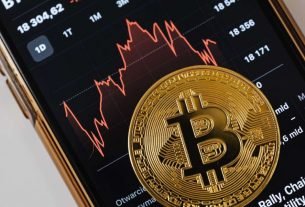
At the worst possible time, Donald Trump entered the NFT community. The ex-president’s hyped-up “major announcement” turned out to be a set of digital trading cards for $99 each, drawing widespread ridicule from late-night hosts and even Trump supporters like Steve Bannon and Michael Flynn.
But the worst news for Trump is that the NFT bubble has burst, according to almost every metric.
Digital artwork and collectibles are examples of non-fungible tokens and are typically purchased using cryptocurrencies. Beginning in 2020, the value and popularity of NFT art and collectibles exploded. Celebrities promoted digital cartoon apes and other NFT imagers on television and social media, making them commonplace.
However, it appears as though the glory days are over.
According to CryptoSlam, the total volume of NFTs traded in January was down 89% from its peak. According to Dune Analytics, the volume of trades on the NFT marketplace OpenSea is at its lowest level since June 2021. A Bored Ape Yacht Club NFT, the most well-known collection in the industry, is now available for just $80,466, an 81% decrease from its peak value.
During the so-called crypto winter caused by waning interest and general chaos in the crypto markets, NFTs have lost value. According to Coinmarketcap, the dramatic decline of major crypto exchange FTX and its founder, Sam Bankman-Fried, capped a turbulent year in the sector, which saw the total market value of crypto drop by more than 63%.
As prices fall to new lows, the crypto winter doesn’t seem to be coming to an end. Now, Congress and regulators are looking at crypto.
Despite the unfortunate timing, Trump’s NFT collection has risen to the top of the NFT marketplace OpenSea’s ranking and generated over $1.4 million in revenue since its launch. On the Trump Computerized Exchanging Cards site, the Trump assortment professes to be “sold out” and the floor cost for a solitary card has ascended to $177.99, as indicated by investigation site CoinGecko.
How much Trump will personally deduct from those profits is unknown. According to a disclosure on the Trump Card Collection website, the collection is “not owned, managed, or controlled” by Trump or his companies; rather, the likeness of Trump was licensed to “NFT INT LLC.” The LLC doesn’t have a website and lists its address in a Park City, Utah, mall next to an Asian restaurant and vape shop.
Collect Trump Cards is the name that former US President Donald Trump has given to his own NFT collection. The project’s official website states that there will be 45,000 NFTs available, each costing $99. In addition to the NFTs themselves, investors stand a chance to win exclusive prizes like dinner with the previous US President.
Even recording a commercial for the upcoming campaign, Trump has already begun to circulate crypto Twitter.
Jesus Christ there’s a commercial for it. 🤦♂️
— Autism Capital 🧩 (@AutismCapital) December 15, 2022
pic.twitter.com/aNOSlq7mX2
At the moment, celebrities who endorse crypto are particularly under scrutiny.
Recently a legal claim was documented against superstars including Jimmy Fallon, Justin Bieber and Serena Williams, blaming them for inappropriately advancing The Exhausted Gorilla Yacht Club NFT assortment. ” The complaint cites a 2017 SEC statement cautioning against celebrity endorsements, saying, “Crypto promotions are fraught with problems.”
Tom Brady, Gisele Bundchen and Steph Curry were additionally as of late sued for advancing FTX, and in October Kim Kardashian was fined $1.26 million by the Protections and Trade Commission for “unlawfully promoting” EthereumMax tokens.
Another unsuccessful attempt to capitalize on a market trend can be seen in Trump’s last-minute NFT exit: SPACs, or special purpose acquisition companies, enable businesses to go public without incurring the regulatory burden of a traditional IPO. In 2020, celebrities and investors poured into SPACs, which experienced a boom. However, the value of SPACs has significantly decreased due to rising interest rates and a troubled stock market.
Digital World Acquisition Corp., a SPAC that launched in October 2021, a few months after the SPAC boom’s height, has been attempting to merge with Truth Social, Trump’s social media company. After the boom, Trump entered the SPAC world.
Benn Eifert, a QVR Advisors hedge fund manager, stated, “When The Donald launched his SPAC in October 2021, the writing was already in blood on the wall for the SPAC bubble.” He gave in to a clear breakdown.
Celebrity endorsements of cryptocurrencies are currently the focus of particular scrutiny.
A class-action lawsuit was filed earlier this month against celebrities like Serena Williams, Justin Bieber, and Jimmy Fallon, claiming that they misrepresented the Bored Ape Yacht Club NFT collection.
According to the complaint, “Celebrity promotions of cryptocurrencies are fraught with problems,” the SEC issued a statement in 2017 advising against such endorsements.
Steph Curry, Gisele Bundchen, and Tom Brady have all been accused of promoting FTX. In October, the Securities and Exchange Commission fined Kim Kardashian $1.26 million for “unlawfully touting” EthereumMax tokens.
Another late attempt to capitalize on a market trend is reflected in Trump’s last-minute NFT entrance: SPACs, or special purpose acquisition companies, enable businesses to go public without incurring the regulatory burden of a traditional IPO. In 2020, celebrities and investors poured into SPACs, which experienced a boom. However, the value of SPACs has significantly decreased due to rising interest rates and a troubled stock market.
Digital World Acquisition Corp., a SPAC that launched in October 2021, a few months after the SPAC boom’s peak, has been attempting to merge with Truth Social, Trump’s social media company. After the boom, Trump entered the SPAC world.
Benn Eifert, a QVR Advisors hedge fund manager, stated, “When The Donald launched his SPAC in October 2021, the writing was already in blood on the wall for the SPAC bubble.” He gave in to a clear fall.”
The first Presidential NFT collection hits the shelves
The advertisement, which resembles a 1990s commercial, promises that each NFT will include original artwork created by illustrator Clark Mitchell. Users may also win additional prizes by purchasing any of the NFTs, as previously mentioned.
A dinner with Trump, a face-to-face meeting, Zoom calls, allowing the user and their friends to spend a day at one of his luxurious golf courses, signing memorabilia, and other things were mentioned by Trump.
The former US President noted that, with the exception of the fact that they are collected digitally on smartphones and computers, the cards are comparable to baseball cards. A credit card and an email are all that are required to obtain one. Customers are free to acquire as many cards as they need.
The website says that the collection is already sold out, but Trump’s fans may not have to wait long to get their hands on his digital products because he made it clear that this is the “first” collection he will release.
Trump launches NFTs only three years after saying he doesn’t like crypto
I am not a fan of Bitcoin and other Cryptocurrencies, which are not money, and whose value is highly volatile and based on thin air. Unregulated Crypto Assets can facilitate unlawful behavior, including drug trade and other illegal activity....
— Donald J. Trump (@realDonaldTrump) July 12, 2019
Curiously, the previous president appears to have had a shift in perspective with respect to cryptographic forms of money and other blockchain items. He has previously expressed open opposition to digital assets.
Many of you may recall Trump’s July 2019 tweets explaining why he dislikes Bitcoin and other cryptocurrencies. He asserts that cryptocurrencies are not equivalent to money and that the value of them is “highly volatile and based on thin air.”
In the wake of the launch of the new NFT ad campaign, many others recalled this tweet and returned to it to highlight the changes that had occurred over the past three and a half years.
Naturally, Trump is not the only one who reconsidered crypto during and after COVID-19. In the year 2020, a lot of important people in the investment industry who had previously been skeptical of crypto changed their minds, even announcing that they would put everything in crypto and gold.
The second crypto winter in four years in 2022 marked another shift in the industry. This one, like the previous one, has been around for more than a year now, and it still doesn’t seem to be stopping.
Regarding Trump’s NFT campaign, some believe he is “late to the party,” while others believe it is the ideal time to launch NFTs, anticipating a market turnaround following the holidays. The fact that the collection was quickly sold means that, regardless of whether the former US President has delivered his collection on time, it has been an absolute success.
Donald Trump’s entrance into the NFT world came at the worst possible moment
The Ex-President’s hyped-up “major announcement” turned out to be a set of digital trading cards that sold for US$99 (NZ$156) each. This made late-night hosts and even some Trump loyalists like Michael Flynn and Steve Bannon laugh at the former President.
But the worst news for Trump is that the NFT bubble has burst, according to almost every metric.
Digital artwork and collectibles are examples of non-fungible tokens and are typically purchased using cryptocurrencies. Beginning in 2020, the value and popularity of NFT art and collectibles exploded.
Celebrities promoted digital cartoon apes and other NFT imagers on television and social media, making them commonplace.
However, it appears as though the glory days are over.
According to CryptoSlam, the total volume of NFTs traded in January was down 89% from its peak. According to Dune Analytics, the volume of trades on the NFT marketplace OpenSea is at its lowest level since June 2021.
A Bored Ape Yacht Club NFT, the most well-known collection in the industry, is now available for just $80,466, an 81% decrease from its peak value.
During the so-called crypto winter caused by waning interest and general chaos in the crypto markets, NFTs have lost value. The sensational fall of major crypto trade FTX (and its organizer Sam Bankman-Seared) has been the cap to a wild year in the space, with the all out market worth of crypto dropping in excess of 63%, as per Coinmarketcap.
As prices fall to new lows and regulators and Congress now have crypto in their sights, the crypto winter is showing few signs of thawing.
Despite the bad timing, Trump’s NFT collection has risen to the top of the NFT marketplace OpenSea’s ranking and generated over $1.4 million in revenue since its launch. According to analytics website CoinGecko, the Trump collection claims to be “sold out” on the website for Trump Digital Trading Cards, and the floor price for a single card has increased to US$177.99 (NZ$279).
How much Trump himself will receive from those profits is unknown. The Ace in the hole Assortment site incorporates an exposure that says the Trump assortment is “not possessed, oversaw or controlled” by Trump or his organizations and on second thought his similarity was authorized to “NFT INT LLC”.
The LLC doesn’t have a website and lists its address in a Park City, Utah, mall next to an Asian restaurant and vape shop.


